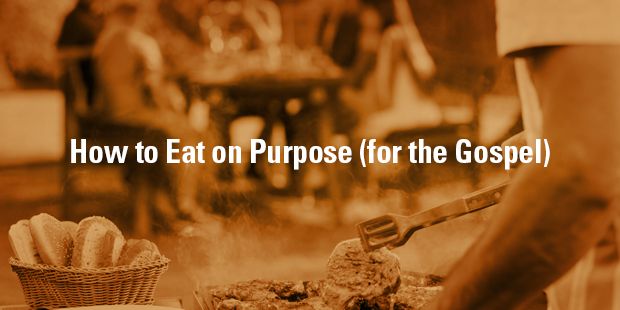
How to Eat on Purpose (for the Gospel)
If you and others around you are going to grow in gospel fluency, you need consistent immersion in a gospel-speaking community. This needs to be much more than a weekly gathering of the church where the gospel is preached (though it should include this). It also should be more than a weekly Bible study, small-group gathering, or missional-community meeting (though I also recommend these). Growth in gospel fluency requires regularly being with others who know and love Jesus, speak about him often, and commit together to regularly remind one another of the gospel when they forget.
Remember
From the very beginning of the story, the act of eating has played a very significant role in the worship and remembrance of who God is, what he has done, and who we are. God provided a great place for Adam and Eve to live, with all the food they needed. They regularly had the opportunity to remember God, his word, and his work, as well as who they were and what they were called to do. For them, every meal was a time to remember God’s abundant provision and express their worship of him alone.
When we eat, we see that our food looks good. Some meals look like a painting by Monet, others look like a Picasso, but they are all works of art. We can smell our food. Just think of all the wonderful aromas of the best meals you’ve had. Don’t you love them! And as you put your food in your mouth, there’s an explosion of sensations—sweet, sour, bitter, salty. It’s like a party in your mouth! And you don’t just taste your food, you feel it as well. There are so many textures to experience. And then you hear it as it crunches, or sloshes or slurps its way into your body (some people are annoyed at this part of eating). Through all of this, you are nourished and replenished, strengthened and rebuilt. God wants us to eat and remember—enjoy and worship him—and, at the same time, have our needs met by him.
Our Needs Are Met
Remember what he said to Adam and Eve: “Eat from any tree in the garden except the tree of the knowledge of good and evil. If you eat of that tree, you will surely die” (see Gen. 2:16–17). Every meal was an opportunity to remember, trust, and obey. Every meal was meant to be an act of remembrance and worship. But they didn’t remember, trust, and obey. They ate unto themselves. God designed them to trust in his ability to provide for them. Something outside of them was meant to take care of a deep need inside of them—and he would provide that something. They were not to look outside of his provision.
All of this was meant to point us toward God’s ultimate provision in Jesus. Eventually, Jesus came to be God’s ultimate provision for us. He is the bread of life that meets our deepest needs and satisfies our greatest longings. Every meal is meant to cause us to remember and worship Jesus.
What if you took time at every meal—even very simple ones—to give thanks to God, praying not just at the beginning, but throughout the meal? Our family is trying to use our evening mealtimes more intentionally. We are presently rehearsing the Ten Commandments and going through the gospel with each one of them. We also have given each night a theme to guide what we do together at the meal.
On Mission Monday, we remember together our family’s mission to glorify God and fulfill his purposes in saving us… Teaching Tuesday is when one of the children takes responsibility for our learning from God’s word at the meal… With-Family Wednesday is the night we eat with our missional community… Thanks- giving Thursday is when we take time to give thanks for all God has done… On Fun Friday, we go out to eat, or we eat together and then go to a movie, have a game night, or take a special outing… Serving Saturday often means we are with others for a meal or serving some people… And Sunday is when we remember Jesus through taking communion together at our church’s gathering.
Consider our normal, everyday meals: what if your friends, your family, your small group, or your missional community made it a point to make every single meal a remembrance and worship experience? What if you slowed down enough to remember Jesus at every meal? What if you savored every moment as an opportunity to praise God?
(Taken from Gospel Fluency Handbook by Jeff Vanderstelt, ©2017)

Tags: Gospel, Gospel Fluency, Jeff Vanderstelt












